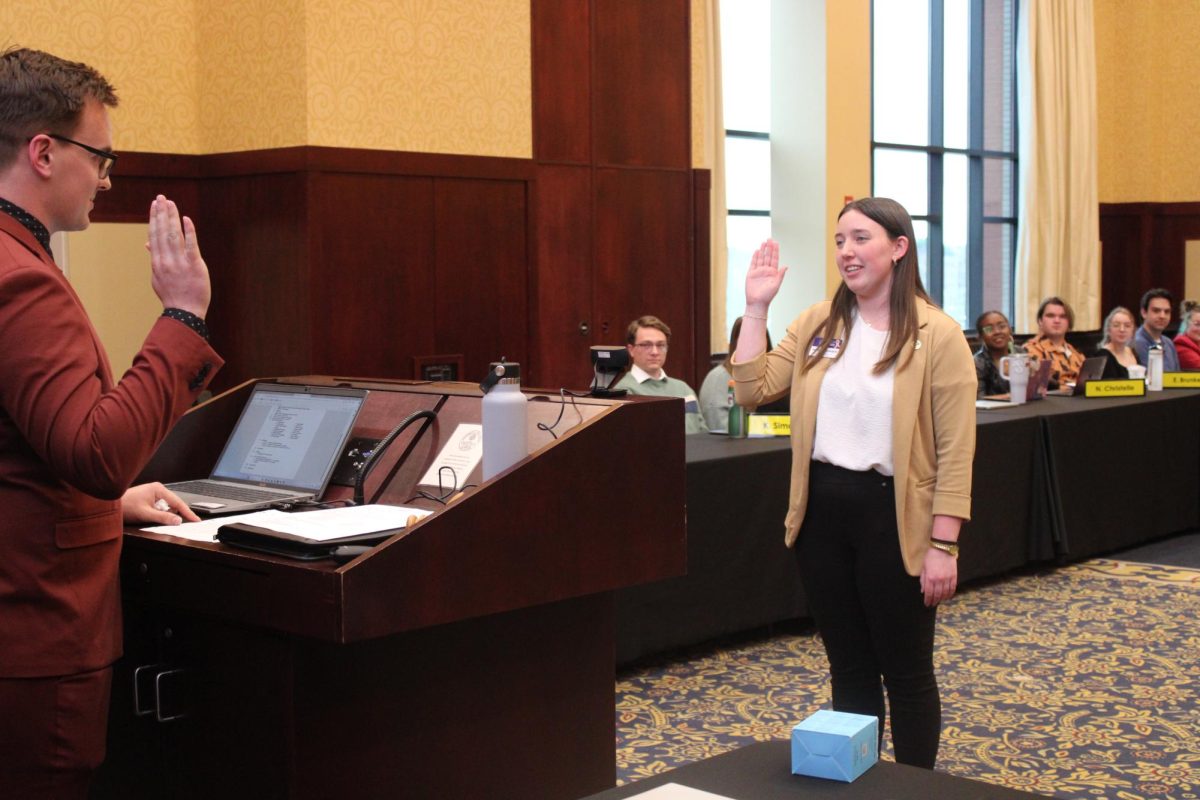While sifting through boxes containing almost 30 years of his neighborhood group’s notes, Ken Fulgione notices the same continuing problems.
They include heavy traffic on State Street, pedestrian safety, bad landlords and an excess of student parking off campus.
Fulgione, president of the Third Ward Neighborhood Association in the lower campus area, is trying to alleviate the latter by getting the university to offer better parking options to its students.
It’s been a problem throughout the years and Fulgione says the university has never done anything to fix it.
The neighborhood includes roadways like Roosevelt, McKinley, Garfield and Lincoln avenues.
What used to be a two-block problem in the neighborhood has expanded to four, Fulgione said.
“There’s more people with more cars,” he said.
Garbage along the streets, blocked driveways and usually no room for residents to park in front of their homes are problems, Fulgione said.
Although now stalled for talks with campus officials, some Third Ward members sought a residents-only parking permit program earlier this year with the city.
City officials are creating a survey that would gauge the amount of support for such a program in the neighborhood, said David Walter, city traffic engineer.
“There are a lot of unanswered questions right now,” Walter said.
City Council has to approve any ordinance or program put in place.
UW-Eau Claire officials are pleased with the Third Ward’s willingness to talk, Vice Chancellor Andy Soll said.
The university continues to think of ideas to ease the problem but it will wait for a final plan by the Third Ward before publicly discussing its options, Soll said.
“I’m not sure what will come out of this,” Soll said of the talks. “We don’t know what we’re facing.”
Student Senator Ben Lane, a Senate liaison to the Third Ward, said part of living in a university community is dealing with parking related to the campus.
The university contributes much to the community and cutting off-campus parking would create problems for those attending classes or events, he said.
“If they put a ban on (parking), it’s just going to hinder the university,” Lane said.
The Third Ward realizes any parking permit system would “put an unnecessary burden” on the campus, Fulgione said. The group is willing to talk with the campus because it recognizes it as a big part of the community, he said.
Yet, students have “to recognize what they’re doing in the neighborhood,” Fulgione said.
If the university accepts students, it also should provide them parking, he said.
Students should be able to park on the streets because they are a part of the community and they pay city taxes as well, Soll said.
Some in the Third Ward think the university will create more spaces if the group gets city approval of parking restrictions, said Soll, who added that he doesn’t know if that would be the result.
Although it’s a possibility, the university doesn’t know where it could buy land, he said.
An expansion of parking into Campus Mall would require a big investment and cause a major disruption to campus, he said.
University officials have talked about a shuttle bus system from a remote lot, Soll said, which the Third Ward supports. But it involves finding land, creating a bus route to campus and Soll said he questions its potential use.
A parking ramp would involve very significant cost implications and its use is uncertain, he said.
The campus lots accommodate the demand for permit parking, he said, but cannot contain all faculty and students’ vehicles.
The campus sells more permits than it has spaces because not everyone is on campus at the same time, Soll said. The four lower campus lots have 1,239 spaces.
A university survey conducted Sept. 11-12 of the permit parking lots showed that the south side lots – Hibbard and Phillips – usually are full, yet the north lots – Water Street and Haas Fine Arts – almost always have vacancies. The Water Street lot averaged between 105 and 120 vacancies during the day. Haas Fine Arts averaged between 27 and 53 open spaces.
Because of the lots’ vacancies, campus officials haven’t properly addressed the problem, Fulgione said.
“They need to start exploring it rather than ignoring it,” he said.
The decision to park on the area’s streets or wait for a meter is a student’s choice, Soll said.
Jim Wold, assistant to the city’s director of public works, agreed it partly stems from students acting on their own parking desires.
“If that perception is there, that’s what’s going to happen,” Wold said. “You’re never going to change it.”
The lower campus parking situation could change eventually. But Fulgione stressed that the Third Ward is focused on discussing ways the university could avoid being troubled, while still fixing the neighborhood’s yearly parking dilemma.
“I mean, it’s really funny,” Fulgione said. “It doesn’t get any better and it doesn’t change.”






